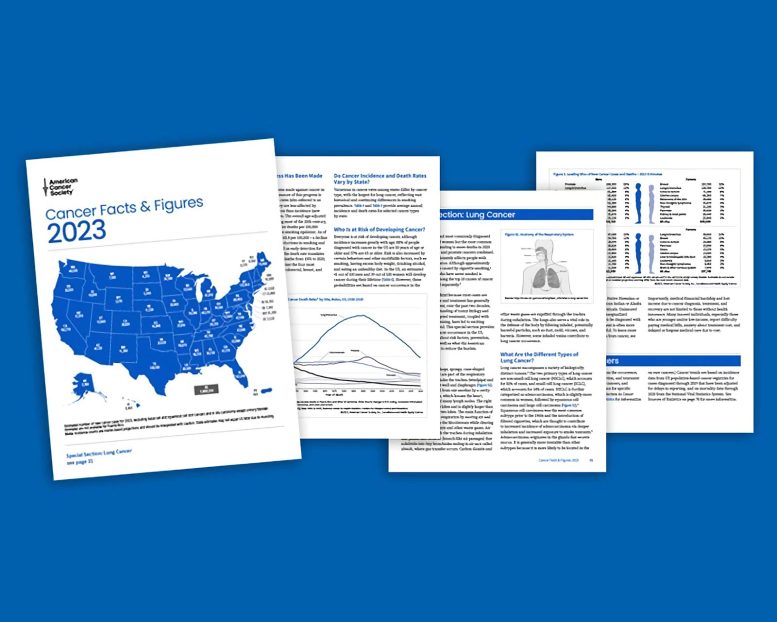
The American Cancer Society (ACS) has issued its annual Cancer Statistics report for 2023. The report highlights a 33% decrease in overall cancer mortality since 1991, preventing an estimated 3.8 million deaths. The report also projects 1,958,310 new cancer cases and 609,820 cancer deaths in the United States for 2023. These findings were published in the journal CA: A Cancer Journal for Clinicians and Cancer Facts & Figures 2023, which is a consumer-friendly version of the report. Credit: American Cancer Society
American Cancer Society releases latest cancer statistics, launches initiative to address prostate cancer resurgence and disparities.
Today, the American Cancer Society (ACS) released Cancer Statistics, 2023, the organization’s annual report on cancer facts and trends. According to the report, overall cancer mortality has dropped 33% since 1991, averting an estimated 3.8 million cancer deaths. Based on ACS data, in 2023 there are projected to be 1,958,310 new cancer cases and 609,820 cancer deaths in the United States. These major findings were published today in CA: A Cancer Journal for Clinicians, alongside its consumer-friendly companion, Cancer Facts & Figures 2023, available on cancer.org.
Two of the most critical findings are driven by substantial changes in cancer prevention and screening in the last decade. First, there was an astounding 65% reduction in cervical cancer rates in women ages 20-24 from 2012 through 2019, in the wake of the introduction of the human papillomavirus (HPV) vaccine. “The large drop in cervical cancer incidence is extremely exciting because this is the first group of women to receive the HPV vaccine, and it probably foreshadows steep reductions in other HPV-associated cancers,” said Rebecca Siegel, senior scientific director, surveillance research at the American Cancer Society, and the lead author of the report.
This is clear population-level evidence that vaccination can reduce cancer incidence and provides optimism for expanding research toward the development of additional cancer prevention vaccines. “Increased investment in strategies to harness the immune system in cancer prevention is warranted,” said Dr. Ahmedin Jemal, senior vice president, surveillance and health equity science at the American Cancer Society and senior author of the study.
By contrast, prostate cancer, which is the second leading cause of cancer death for men in the U.S., increased by 3% per year from 2014 through 2019 after two decades of decline. Most concerning is that this increase was driven by the diagnosis of advanced disease. Since 2011, the diagnosis of advanced-stage (regional- or distant-stage) prostate cancer has increased by 4% to 5% annually and the proportion of men diagnosed with distant-stage disease has doubled. These findings underscore the importance of understanding and reducing this trend.
“The increasing percentage of men presenting with advanced prostate cancer, which is much more difficult to treat and often incurable, is highly discouraging,” said Dr. Karen E. Knudsen, chief executive officer at the American Cancer Society. “In order to end cancer as we know it, for everyone, it is imperative for us to focus on cancers where trends for incidence and mortality are going in the wrong direction.”
Added Dr. William Dahut, chief scientific officer at the American Cancer Society, “We must address these shifts in prostate cancer, especially in the Black community, since the incidence of prostate cancer in Black men is 70% higher than in White men and prostate cancer mortality rates in Black men are approximately two to four times higher than those in every other racial and ethnic group.”
IMPACT: Improving Mortality from Prostate Cancer Together
To address the alarming trends in prostate cancer, ACS is launching IMPACT, an initiative geared toward Improving Mortality from Prostate Cancer Together.
“This groundbreaking initiative will leverage our unique organizational strengths to mobilize resources across advocacy, patient support and research,” said Knudsen. “ACS is committed to utilizing a tripartite strategy to reverse prostate cancer disparities and reduce death rates from prostate cancer in all demographics and disparities for Black men by 2035.”
“IMPACT will fund bold new cancer research programs that connect the laboratory, the clinic, and the community,” said Dahut. “These studies will help discern who is most at risk for prostate cancer, and how to prevent it.” Additional IMPACT programs will enable the expansion of patient support to facilitate access to quality prostate cancer screening and care, as well as public policy advancement designed to directly address the burden of prostate cancer on the U.S. population.
“Our overall goals, for all men, can only be accomplished with community partnerships, including standing shoulder to shoulder with trusted organizations that share our vision to meaningfully address disparities in prostate cancer,” said Knudsen. “This is a critical initiative, and we are seeking partnerships with diverse stakeholders to ensure its success.”
ACS author Dr. Nikita Sandeep Wagle also participated in the study.
The complete Cancer Facts & Figures, 2023, report can be found here:
Reference: “Cancer statistics, 2023” by Rebecca L. Siegel MPH, Kimberly D. Miller MPH, Nikita Sandeep Wagle MBBS, MHA, PhD and Ahmedin Jemal DVM, PhD, 12 January 2023, CA: A Cancer Journal for Clinicians.
DOI: 10.3322/caac.21763









Be the first to comment on "Latest Cancer Statistics Released by American Cancer Society – 3.8 Million Cancer Deaths Averted"